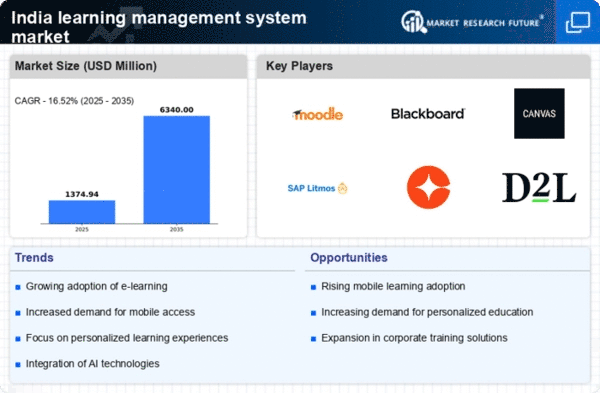Increased Focus on Data Analytics
Data analytics is becoming a crucial component of the learning management-system market in India. Organizations are increasingly leveraging data to assess training effectiveness and learner performance. By utilizing analytics, companies can identify skill gaps and tailor training programs accordingly. Approximately 45% of organizations in India are now using data-driven insights to enhance their learning strategies. This focus on analytics not only improves the quality of training but also ensures a return on investment for organizations. As the demand for measurable outcomes in training increases, the learning management-system market is likely to expand, driven by the need for data-informed decision-making in educational and corporate training environments.
Government Initiatives and Support
Government initiatives aimed at promoting digital education are significantly impacting the learning management-system market in India. Programs such as Digital India and Skill India are designed to enhance access to quality education and training. The government has allocated substantial funding, with an estimated budget of over $1 billion for digital education initiatives. This financial support encourages the adoption of learning management systems across various sectors, including education and corporate training. As educational institutions and businesses align with these initiatives, the demand for effective learning management solutions is expected to rise. The government's commitment to improving educational infrastructure is likely to create a conducive environment for the growth of the learning management-system market.
Rising Demand for Skill Development
the learning management system market is experiencing a notable surge in demand for skill development programs. As industries evolve, there is an increasing need for employees to acquire new skills to remain competitive. Reports indicate that approximately 60% of organizations in India are investing in training initiatives to enhance workforce capabilities. This trend is driven by the need for continuous learning and adaptation to technological advancements. Consequently, learning management systems are being adopted to facilitate this training, providing a structured approach to skill acquisition. The emphasis on upskilling and reskilling is likely to propel the growth of the learning management-system market, as organizations seek efficient solutions to meet their training needs.
Shift Towards Blended Learning Models
the learning management system market is witnessing a shift towards blended learning models, combining traditional classroom instruction with online learning. This approach caters to diverse learning preferences and enhances engagement among learners. Research suggests that blended learning can improve retention rates by up to 30%. Educational institutions and corporate organizations are increasingly adopting this model to provide flexible learning options. The integration of learning management systems facilitates the seamless delivery of blended courses, allowing for a more personalized learning experience. As the demand for flexible and effective training solutions grows, the learning management-system market is likely to benefit from this trend, positioning itself as a key player in the education sector.
Growing Emphasis on Employee Engagement
Employee engagement is a critical factor influencing the learning management-system market in India. Organizations are recognizing the importance of engaging employees through effective training programs. Studies indicate that engaged employees are 17% more productive and 21% more profitable. As a result, companies are investing in learning management systems that promote interactive and engaging learning experiences. The focus on employee engagement is likely to drive the adoption of innovative training solutions, such as gamified learning and social learning platforms. This trend suggests that the learning management-system market will continue to grow as organizations seek to enhance employee satisfaction and performance through targeted training initiatives.
















